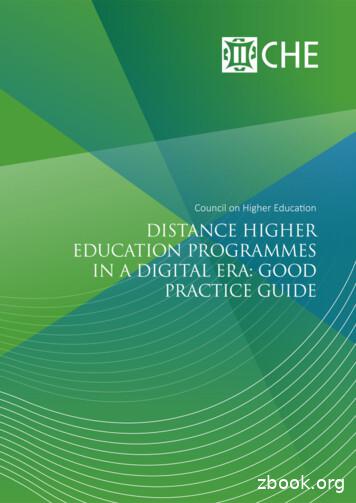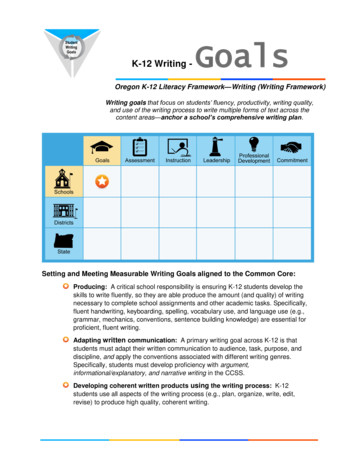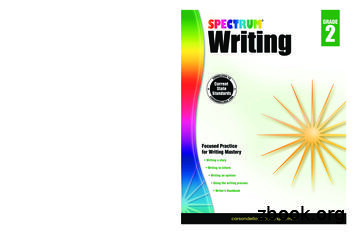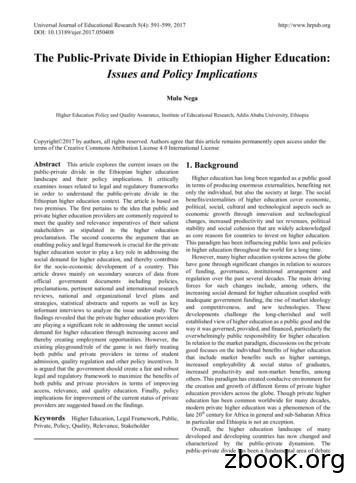STUDENT WRITING IN HIGHER EDUCATION . - University Of Kent
Studies in Higher Education, Jun 98, Vol. 23 Issue 2, p157, 16pSTUDENT WRITING IN HIGHER EDUCATION: AN ACADEMICLITERACIES APPROACHMARY R. LEA Institute of Educational Technology, Open University, UK andBRIAN V. STREET King's College, London, UKABSTRACT This article addresses the issue of student writing in higher education. It drawson the findings of an Economic and Social Research Council funded project which examinedthe contrasting expectations and interpretations of academic staff and students regardingundergraduate students' written assignments. It is suggested that the implicit models thathave generally been used to understand student writing do not adequately take account ofthe importance of issues of identity and the institutional relationships of power andauthority that surround, and are embedded within, diverse student writing practices acrossthe university. A contrasting and therefore complementary perspective is used to presentdebates about 'good' and poor' student writing. The article outlines an 'academicliteracies' framework which can take account of the conflicting and contested nature ofwriting practices, and may therefore be more valuable for understanding student writing intoday's higher education than traditional models and approaches.IntroductionThe opinion is often expressed that standards of student 'literacy' are falling, whether atschool or in higher education: many academic staff claim that students can no longerwrite. 'Back to basics' ideas are now fast taking hold in today's higher education. Recently,we received an award from the Economic and Social Research Council to conduct aresearch project entitled 'Perspectives on Academic Literacies: an institutional approach'that attempted to look at these issues in more depth. The research looked at perceptionsand practices of student writing in higher education, taking as case studies one new andan old university in southern England. Set against the background of numerous changes inhigher education in the UK and increasing numbers of non-traditional entrants, thisresearch has been concerned with a wider institutional approach to student writing, ratherthan merely locating 'problems' with individual students. One of the main purposes of theresearch has been to move away from a skills-based, deficit model of student writing andto consider the complexity of writing practices that are taking place at degree level inuniversities. As a starting point, the research adopts the concept of academic litefacies asa framework for understanding university writing practices.Academic LiteraciesLearning in higher education involves adapting to new ways of knowing: new ways ofunderstanding, interpreting and organising knowledge. Academic literacy practices-reading and writing within disciplines--constitute central processes through which studentslearn new subjects and develop their knowledge about new areas of study. A practicesapproach to literacy takes account of the cultural and contextual component of writing andreading practices, and this in turn has important implications for an understanding ofstudent learning. Educational research into student learning in higher education hastended to concentrate on ways in which students can be helped to adapt their practices tothose of the university (Gibbs, 1994)' from this perspective, the codes and conventions ofacademia can be taken as given. In contrast, our research is founded on the premise thatin order to understand the nature of academic learning, it is important to investigate theunderstandings of both academic staff and students about their own literacy practices,without making prior assumptions as to which practices are either appropriate or effective.This is particularly important in trying to develop a more complex analysis of what itmeans to become academically literate. We believe that it is important to realise thatmeanings are contested amongst the different parties involved: institutions, staff and
students. Viewing literacy from a cultural and social practice approach (rather than interms of educational judgements about good and bad writing) and approaching meaningsas contested can give us insights into the nature of academic literacy in particular andacademic learning in general: through researching these differing expectations andinterpretations of university writing we hope to throw light on failure or non-completion, aswell as success and progression.The notion of academic literacies has been developed from the area of 'new literacystudies' (Street, 1984; Barton, 1994; Baynham, 1995) and is an attempt to draw out theimplications of this approach for our understanding of issues of student learning. We haveargued elsewhere (Lea & Street, 1997a) that educational research into student writing inhigher education has fallen into three main perspectives or models: 'study skills';'academic socialisation'; and 'academic literacies' (see appendix). The models are notmutually exclusive, and we would not want to view them in a simple linear time dimension,whereby one model supersedes or replaces the insights provided by the other. Rather, wewould like to think that each model successively encapsulates the other, so that theacademic socialisation perspective takes account of study skills but includes them in thebroader context of the acculturation processes we describe later, and likewise theacademic literacies approach encapsulates the academic socialisation model, building onthe insights developed there as well as the study skills view. The academic literaciesmodel, then, incorporates both of the other models into a more encompassingunderstanding of the nature of student writing within institutional practices, powerrelations and identities, as we explain later. We take a hierarchical view of the relationshipbetween the three models, privileging the 'academic literacies' approach. We believe that,in teaching as well as in research, addressing specific skills issues around student writing(such as how to open or close an essay or whether to use the first person) takes onentirely different meanings if the context is solely that of study skills, if the process is seenas part of academic socialisation, or if it is viewed more broadly as an aspect of the wholeinstitutional and epistemological context. We explicate each model in turn as both asummary of our major findings in the research project and as a set of lenses throughwhich to view the account we give of the research.The study skills approach has assumed that literacy is a set of atomised skills whichstudents have to learn and which are then transferable to other contexts. The focus is onattempts to 'fix' problems with student learning, which are treated as a kind of pathology.The theory of language on which it is based emphasises surface features, grammar andspelling. Its sources lie in behavioural psychology and training programmes and itconceptualises student writing as technical and instrumental. In recent years the crudityand insensitivity of this approach have led to refinement of the meaning of the 'skills'involved and attention to broader issues of learning and social context, and have led us towhat we (Lea & Street, 1997a) have termed the 'academic socialisation' approach.From the academic socialisation perspective, the task of the tutor/adviser is to inductstudents into a new 'culture', that of the academy. The focus is on student orientation tolearning and interpretation of learning tasks, through conceptualisation, for instance, of adistinction between 'deep', 'surface' and 'strategic' approaches to learning (Marton et aL,1997). The sources of this perspective lie in social psychology, in anthropology and inconstructivist education. Although more sensitive both to the student as learner and to thecultural context, the approach could nevertheless be criticised on a number of grounds. Itappears to assume that the academy is a relatively homogeneous culture, whose normsand practices have simply to be learnt to provide access to the whole institution. Eventhough at some level disciplinary and departmental difference may be acknowledged,institutional practices, including processes of change and the exercise of power, do notseem to be sufficiently theorised. Similarly, despite the fact that contextual factors instudent writing are recognised as important (Hounsell, 1988; Taylor et aL, 1988), thisapproach tends to treat writing as a transparent medium of representation and so fails toaddress the deep language, literacy and discourse issues involved in the institutionalproduction and representation of meaning.The third approach, the one most closely allied to the New Literacy Studies, we refer to asacademic literacies. This approach sees literacies as social practices, in the way we havesuggested. It views student writing and learning as issues at the level of epistemology and
identities rather than skill or socialisation. An academic literacies approach views theinstitutions in which academic practices take place as constituted in, and as sites of,discourse and power. It sees the literacy demands of the curriculum as involving a varietyof communicative practices, including genres, fields and disciplines. From the student pointof view a dominant feature of academic literacy practices is the requirement to switchpractices between one setting and another, to deploy a repertoire of linguistic practicesappropriate to each setting, and to handle the social meanings and identities that eachevokes. This emphasis on identities and social meanings draws attention to deep affectiveand ideological conflicts in such switching and use of the linguistic repertoire. A student'spersonal identity-who am 'I'--may be challenged by the forms of writing required indifferent disciplines, notably prescriptions about the use of impersonal and passive formsas opposed to first person and active forms, and students may feel threatened andresistant--'this isn't me' (Lea, 1994; Ivanic, 1998). The recognition of this level ofengagement with student writing, as opposed to the more straightforward study skills andacademic socialisation approaches, comes from the social and ideological orientation of the'New Literacy Studies'. Allied to this is work in critical discourse analysis, systemicfunctional linguistics and cultural anthropology, which has come to see student writing asbeing concerned with the processes of meaning-making and contestation around meaningrather than as skills or deficits. There is a growing body of literature based upon thisapproach, which suggests that one explanation for problems in student writing might bethe gaps between academic staff expectations and student interpretations of what isinvolved in student writing (Cohen, 1993; Lea, 1994; Street, 1995; Lea & Street, 1997b;Stierer, 1997).The ResearchDuring 1995-96 we carried out research at two universities, one new and one traditional,in the south-east of England. Ten interviews were conducted with staff in the olderuniversity and 21 students were interviewed, either individually or in small groups. At thenew university, 13 members of academic staff and 26 students were interviewed in thesame way. The interviews at both institutions included the Directors of Quality AssuranceUnits and 'learning support' staff.One of our initial research objectives was to explore the contribution of ethnographicbasedresearch to educational development in higher education. The short length of the projectlimited the in-depth ethnographic approach which such research could warrant. However,we did adopt an 'ethnographic style' approach (Green & Bloome, 1997) to the researchwhich included conducting in-depth, semi-structured interviews with staff and students,participant observation of group sessions and attention to samples of students' writing,written feedback on students' work and handouts on 'essay' writing. A major part of theresearch has included a linguistically-based analysis of this textual material. As theresearch progressed we realised that this was an equally important source of data whichwe needed to consider in relation to the interview data. As researchers we were able tobenefit from our own situated knowledge of the institutional settings within which we wereresearching. Adopting an ethnographic style approach to the research, within settings ofwhich we already had prior knowledge, enabled us to move away from the focus ontranscribed interview material to a more eclectic approach, merging the importance ofunderstanding both texts and practices in the light of staff and student interpretations ofuniversity writing.Our research, then, was not based on a representative sample from which generalisationscould be drawn but rather was conceived as providing case studies that enabled us toexplore theoretical issues and generate questions for further systematic study. Ourapproach, therefore, was in the ethnographic tradition described by Mitchell (1984). Ratherthan applying 'enumerative induction' (as in much scientific and statistical research) as ameans to generalising, and for establishing the 'representativeness' of social data, Mitchelladvocates what he terms 'analytical induction':What the anthropologist using a case study to support an argument does is to show howgeneral principles deriving from some theoretical orientation manifest themselves in somegiven set of particular circumstances. A good case study, therefore, enables the analyst to
establish theoretically valid connections between events and phenomena which previouslywere ineluctable. (Mitchell, 1984, p. 239)In the present context, the tutors and students whom we interviewed and the documentswe collected can be taken as case studies of different perspectives on academic literacies.Whilst not representing a sample from which generalisations can be drawn regarding thewhole of English higher education, these case studies can point to important theoreticalquestions and connections that might not otherwise be raised. The data, for instance,enable us to explore the hypothesis that, viewed as 'academic literacies', the beliefs andpractices of tutors and students constitute a different kind of evidence than if this samedata were viewed in terms of skills or academic socialisation. These accounts can, forinstance, provide evidence for differences between staff and students' understanding ofthe writing process at levels of epistemology, authority and contestation over knowledgerather than at the level of technical skill, surface linguistic competence or culturalassimilation. We have therefore approached our research data in order to acquire insightsand conceptual elaboration on our three models of student writing and to generate from itanalytic induction rather than 'enumerative induction'.The unstructured, in-depth interviews examined how students understand the differentliteracy practices which they experience in their studies and in what ways academic staffunderstand the literacy requirements of their own subject area and make these explicit totheir students. We gave participants the opportunity to reflect upon the writing practices ofthe university, at different levels and in different courses, subject areas and disciplines,and to consider not only the influences that were being brought to bear upon them fromwithin the university but also those from other writing contexts. We asked staff to outline,as they saw them, the writing requirements of their own disciplines and subject areas andto describe the kinds and quantities of writing that were involved for their students. Wealso asked them to talk about their perceptions of problems with student writing and theways in which these were addressed at both an individual and departmental level.Students explained the problems that they experienced with writing at the university andtheir perceptions of the writing requirements of different courses and subject areas. Wealso collected copious amounts of documentation from both staff and students: handoutson essay writing; examples of students' written work; course handbooks; assignmentguidelines.A further objective of our research was to contribute towards an institutionalunderstanding of academic literacy practices in higher education and we therefore beganthe project with a focus upon three traditional academic categories: humanities, socialsciences, and natural sciences. In both universities we began by carrying out interviewswith academic staff within each category and then went on to interview students. Early inthe research it became clear from the interview data we were collecting that the traditionalboundaries that we had identified to frame the research were in many senses irrelevant,particularly for students. Our interviews with students alerted us to the fact that olddisciplinary divides were often not appropriate as research categories.The diverse nature of the degree programmes at preliminary level resulted in studentsundertaking what we term 'course switching' which, we suggest, can be paralleled withlinguistic code switching (Gumperz, 1982). In the case of 'course switching' students arehaving to interpret the writing requirements of different levels of academic activity. Suchswitching may range from academic disciplines in a traditional sense (such as physics andanthropology) to what we see as 'fields of study', such as modular programmes thatincorporate elements of different disciplines and of interdisciplinary courses (such as Asianstudies and business studies) and to specific modules or course units within programmes(such as twentieth-century women's literature and operations management). Thisswitching may also encompass the different demands of individual subject tutors and theirpersonal interpretations of writing requirements. As students switch between suchdisciplines, course units, modules and tutors, different assumptions about the nature ofwriting, related to different epistemological presuppositions about the nature of academicknowledge and learning, are being brought to bear, often implicitly, on the specific writingrequirements of their assignments. Evidence from interviews with tutors and students andfrom handouts prepared for students on aspects of 'good' writing suggests that it isfrequently very difficult for students to 'read off' from any such context what might be the
specific academic writing requirements of that context. Nor, as we shall see below, did theprovision of general statements about the nature of academic writing help students withthe specificity of demands in each context.We also interviewed learning support staff in both institutions. The data collected fromthese interviews reinforced the views expressed by students that many of the difficultiesthey experienced with writing arose from the conflicting and contrasting requirements forwriting on different courses and from the fact that these requirements were frequently leftimplicit. Learning support staff also questioned whether academic staff were aware thatthey were asking for specific ways of writing knowledge from their students.Requirements of Student Writing: staff interpretationsThe interviews with staff suggest that academic staff have their own fairly well-definedviews regarding what constitutes the elements of a good piece of student writing in theareas in which they teach. These tend to refer to form in a more generic sense, includingattention to syntax, punctuation and layout, and to such apparently evident components ofrational essay writing as 'structure', 'argument' and 'clarity'. Their own disciplinary historyhad a clear influence on staff conceptualisations and representations of what were themost important elements to look for in students' writing at both levels, although theepistemological and methodological issues that underlay them were often expressedthrough the surface features and components of 'writing' in itself--as we detail below.
new university, 13 members of academic staff and 26 students were interviewed in the same way. The interviews at both institutions included the Directors of Quality Assurance Units and 'learning support' staff. One of our initial research objectives was to explore the contribution of ethnographicbased research to educational development in higher education. The short length of the project .
The Council on Higher Education (CHE) is an independent body established by the Higher Education Act, No. 101 of 1997. The CHE is the Quality Council for Higher Education. It advises the Minister of Higher Education and Training on all higher education issues and is responsible for quality assurance and promotion through the Higher Education .
Best Practice Book for IELTS Writing. Table of Contents IELTS Writing 1 IELTS Writing 9 IELTS Writing - Overview 9 IELTS Academic Writing 10 IELTS ACADEMIC WRITING 10 IELTS General Writing 11 IELTS Writing Task General (Task 1) 12 Sample 1 12 Sample 2 12 Sample 3 13 Sa
Academic Writing Quiz xvii Part 1 The Writing Process 1 1.1 Background to Writing 3 The purpose of academic writing 3 Common types of academic writing 4 The format of long and short writing tasks 4 The features of academic writing 6 Some other common text features 6 Simple and longer sentences 7 Writing in paragraphs 8 1.2 Reading: Finding .
(CCSS) for Writing, beginning in early elementary, will be able to meet grade-level writing goals, experience success throughout school as proficient writers, demonstrate proficiency in writing to earn an Oregon diploma, and be college and career-ready—without the need for writing remediation. The CCSS describe ―What‖ writing skills students need at each grade level and K-12 Writing .
writing samples Writing across the curriculum seeks to understand student writing needs, not to determine good or bad writing. 2 Writing assignments will be an evaluation of teaching methods All writing samples will be anonymous to student and faculty. Submitted samples are identified by course,
Speech Boot Camp Student Writing Intensives (Levels B and C) Student Intensive Continuation Courses (Levels A, B, and C) Teaching Writing: Structure & Style The Two Andrews: On Writing and Teaching Writing Also by Jill Pike: Primary Arts of Language: Writing Program Primary Arts
Writing Spectrum is available in these titles for second grade success: Carson-Dellosa Publishing LLC P.O. Box 35665 Greensboro, NC 27425 USA carsondellosa.com SPECTRUM Writing GRADE 2 Focused Practice for Writing Mastery Writing a story Writing to inform Writing an opinion
public-private divide in higher education. This section presents a brief overview of the key concepts, debates, theoretical assumptions and factors that underlie discussions about the public-private divide in higher education. 3.1. The Concept of Public and Private Good in Higher Education . The public-private distinction in higher education has























